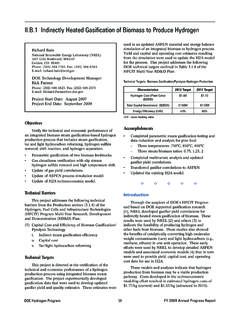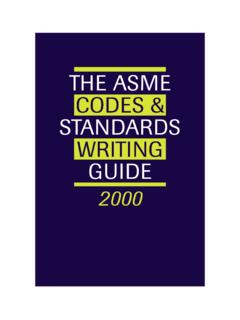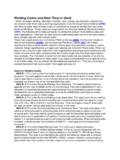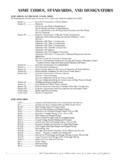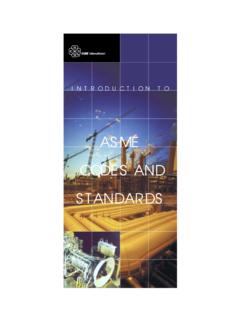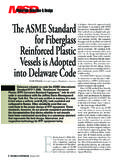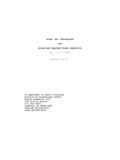Transcription of Hydrogen Codes and Standards
1 DOE Hydrogen Program FY 2005 Progress Hydrogen Codes and StandardsJim Ohi (Primary Contact), Russ Hewett, Lynnae Boyd, and Roland PittsNational Renewable Energy Laboratory (NREL)1617 Cole , CO 80401 Phone: (303) 275-3706; Fax: (303) 275-2905; E-mail: Technology Development Manager: Pat DavisPhone: (202) 586-8061; Fax: (202) 586-9811; E-mail: National Standards Institute (ANSI), New York, NYAmerican society of mechanical Engineers ( asme ), New York, NYCompressed Gas Association (CGA), Chantilly, VACSA America, Inc., Cleveland, OHKelvin Hecht, Hartford, CT International code Council (ICC), Chicago, ILNational Fire Protection Association (NFPA), Quincy, MANational Hydrogen Association (NHA), Washington, DCRon I. Sims, Corvallis, ORVista Consulting, Clementon, NJUnderwriters Laboratories (UL), Northbrook, ILGerald Voecks, La Crescenta, CAStart Date: 1995 Projected End Date: 2015 Objectives Facilitate creation and adoption of model building Codes and equipment Standards for Hydrogen systems in commercial, residential, and transportation applications.
2 Coordinate and conduct research and development (R&D) needed to establish sound technical requirements for Standards , Codes , and regulations for Hydrogen components and systems. Provide technical resources to harmonize development of international Standards among the International Organization for Standardization (ISO), International Electrotechnical Commission (IEC), and Working Party on Pollution and Energy (GRPE).Technical BarriersThis project addresses the following technical barriers from the Hydrogen Codes and Standards section ( ) of the Hydrogen , Fuel Cells & Infrastructure Technologies Program Multi-Year Research, Development and Demonstration Plan: A. Limited Government Influence on Model Codes B. Competition between Standard Development Organizations (SDO) and Model code Development Organizations (CDO). C. Limited State Funds for New Codes D.
3 Large Number of Local Government Jurisdictions (approximately 44,000) E. Lack of Consistency in Training of Officials DOE Hydrogen Program FY 2005 Progress Report1256 F. Limited DOE Role in the Development of International Standards G. Inadequate Representation at International Forums H. International Competitiveness between Domestic and International Standards of National Consensus on Codes and Standards K. Lack of Sustained Domestic Industry Support at International Technical Committees L. Competitiveness in Sales of Published Standards M. Jurisdictional Legacy Issues N. Insufficient Technical Data to Revise National Fire Protection Association (NFPA) 55 Standards O. Affordable Insurance is Not Available P. Large Footprint Requirements for Hydrogen Fueling Stations Q. Parking and Other Access Restrictions.
4 Technical Approach Support and facilitate the timely and efficient incorporation of Hydrogen safety issues into existing and proposed Codes and/or Standards promulgated by organizations such as the International code Council (ICC), NFPA, the society of Automotive Engineers (SAE), and ISO. Support and encourage technical and operational consistency among and across the Codes and Standards developed by different organizations. Identify critical gaps and deficiencies in Codes and Standards and formulate recommendations for addressing them. Familiarize building code officials, fire safety officials, local/state/federal policy makers, and other strategic stakeholders with Hydrogen technologies and the related Codes and Standards . Develop licensing agreement through american National Standards Institute (ANSI) for Web-based access to Standards .
5 Develop training modules and conduct workshops with ICC and NFPA. Create an international template to help develop a unified national agenda and to help support consistent representation of technical experts from industry and government at key global venues. Work with key agencies and industry in other countries to harmonize Standards , Codes , and regulations in all major market areas for Hydrogen technologies. Develop preliminary, near-term specifications and long-term R&D plans for Hydrogen fuel quality for proton exchange membrane (PEM) fuel cells in road vehicles Develop an R&D plan for validating requirements in key Codes and Standards and for testing critical components against these requirements. Develop an R&D plan for an integrated engineering systems approach to Hydrogen National Template for Standards , Codes , and regulations for Hydrogen vehicles and facilities, for on-site Hydrogen generation, and for stationary and portable fuel cells accepted by all key SDOs and CDOs.
6 Continued to develop key Standards to implement National Template: ANSI completed negotiations with all key SDOs and CDOs on posting and viewing Hydrogen Standards and model Codes from a Hydrogen Portal on ANSI s national Standards network and incorporated Codes and Standards matrix and database into the Hydrogen Hydrogen Program FY 2005 Progress Report1257 american society of mechanical Engineers is developing technical requirements for Hydrogen piping and composite transportable containers and coordinating work on metallic containers with Sandia National Laboratories. Compressed Gas Association (CGA), Administrator for the Technical Advisory Group (TAG) of ISO TC197, developed a Web site to manage TAG activity, including accessing drafts of documents, accessing comments, and voting. Discussion is under way with CGA to make the Web site available to other TAGs, such as that for IEC TC105.
7 CSA America is developing a process through which requirements included in initial drafts of three Standards (HPRD1, Pressure Relief Devices for Compressed Hydrogen Vehicle Fuel Containers; HGV2, Hydrogen Vehicle Fuel Containers; and HGV4, Hydrogen Dispensing Systems) can be made more performance-based and, where appropriate, harmonized with the requirements of the Federal Motor Vehicle Safety Standards . ICC incorporated additional provisions for Hydrogen applications (underground storage of liquid Hydrogen and canopy-top storage of gaseous Hydrogen ) in the 2006 edition of ICC model Codes that will help reduce the footprint of Hydrogen fueling stations. NFPA is reviewing Hydrogen safety requirements into two critical Standards , NFPA 52 (Vehicle Fuel Systems) and NFPA 55 (Standard for the Storage, Use and Handling of Compressed Gases and Cryogenic Fluids in Portable and Stationary Containers, Cylinders and Tanks).
8 Underwriters Laboratories (UL) completed draft Standards UL 2264 (Standard for Gaseous Hydrogen Generation Appliances) and UL 2266 (Fuel Cell Power Systems for Use with Telecommunications Systems). Established (with Fuel Cell Council [USFCC] and NHA) a single national committee, the National Hydrogen and Fuel Cells Codes and Standards Coordinating Committee, to consolidate Hydrogen and fuel cell Codes and Standards coordination. Initiated collaborative R&D between the United States and Japan on Hydrogen safety, Codes , and Standards through DOE. Led and Canadian team of experts from industry, government, and academia to establish an agreement with Japan and the European Union on development of Hydrogen fuel quality specifications for PEM fuel cell road vehicles under ISO. Coordinated DOE efforts to create a unified international R&D program to obtain the data needed to create an international standard based on modifications to the Technical Specification for Hydrogen fuel quality developed under ISO.
9 Helped to develop baseline fuel quality testing at the University of Hawaii and worked with General Motors, UTC Fuel Cells, and Ballard to obtain single-cell PEM test hardware and technical expertise for baseline testing. Worked with the Codes and Standards Tech Team of the FreedomCAR and Fuel Partnership (FCFP) to prepare a RD&D Roadmap and to coordinate efforts on R&D for fuel quality, integrated safety engineering, risk assessment, and detection and mitigation of Hydrogen hazards. Participated in the peer review of the Codes and Standards Tech Team by the National Academy of Sciences (NAS). Conducted and hosted (with Sandia/California) a workshop to address risk assessment activities, methodologies, and data requirements and to gather input from experts in risk assessment, the Hydrogen and fuel cell industries, automotive original equipment manufacturers (OEMs), and the insurance industry on how risk assessment can help to set priorities for R&D in Hydrogen safety and Codes and Standards .
10 DOE Hydrogen Program FY 2005 Progress Report1258 Future Directions Initiate R&D for integrated engineering approaches to Hydrogen safety. Initiate comprehensive R&D and testing to develop data for international Hydrogen fuel quality Standards . Refine overall Codes and Standards coordination through the consolidated National Hydrogen and Fuel Cells Codes and Standards Coordinating Committee, with more emphasis on harmonization of requirements in international Standards and Global Technical Regulations. Create a centralized, publicly accessible web-based data center for one-stop technical assistance on Hydrogen Codes and Standards , including a directory of primary contacts for information and technical assistance. Develop and sustain full participation of industry experts in preparation of and negotiations on international Standards and Global Technical Regulations for Hydrogen technologies.


